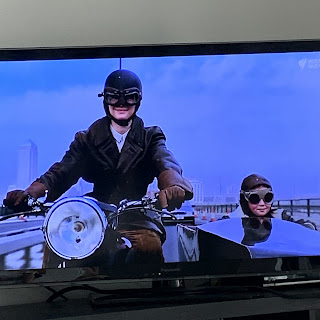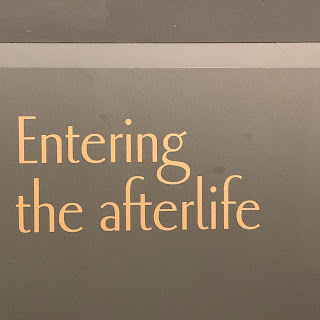Out of isolation and back in the game
Last weekend my kid woke up with Covid exactly 6 days after masks rules were lifted for schools. The absolute dumbest idea. That year’s class started dropping like flies immediately. Anecdotally, please know that kids (and their parents) just weren’t testing with the RATs they were handed and turned up to school when they should have been isolating.
So, I lost a week because I had to isolate as well as look after a sick child. I was furious and may have let off some steam in the form of twitter-ranting.
 |
| Isolation fare: the best scene from Orlando |
Last Sunday, after the big
Covid reveal, I came over to uni to gather some material to work on from
home. I also registered our positive test to the official online site
which told us our household must isolate immediately for 7 days, and monitor
for symptoms. I cancelled our yoga classes (the ones that have been keeping us
sane) and I cooked the most healthy meal I could, French Green Lentil and
Mushroom stew with bruschetta side. My kid ate in their room and we talked to
each other through the door. And we texted:
‘What are your symptoms bub?’
‘Sniffly/runny nose, weak
voice, slightly sore throat’
[sad emjoi]
[3 sadder emojis]
| Me and the kid |
Monday, I notified the school with a little aside that I thought perhaps mandating masks would be a good idea. No response. And the week moved slooooowly.
I tried to concentrate on my
own work in the spaces between seeing correspondences out of Ukraine and
strange clapbacks from Germans saying they are ‘experts on Nazism’ therefore
Russia saying they are fighting against same doesn’t stack up. The discourse is
weird.
For a bit of a gear shift I
wondered whether a poem is a snail’s trail, or a prayer, or prophecy, or a
recipe or a figure. Then I made soup. With crusty bread.
However, in the midst of it all I did manage to submit my abstract for a conference. Hoo. Ray. Now, to wait. And to try to get my momentum back.
* * * *
I have acquired a copy of Irwin
Primer’s bilingual edition of Aphra Behn’s Seneca Unmasqu’d which places her
text alongside (on facing pages) Rochefoucauld’s original French. The book
arrived to me via interlibrary loan and I can only thank this age for being so
connected. The book has come from University of Colorado at Boulder and I can
have it until 30 June 2022.
* * * *
I’m considering the way I’m
going to create a portrait of this object, the manuscript. I have ‘sketches’
and ideas and some mock-ups. I’ve borrowed, from the library, books on
portraiture and books on artists books. And the form I’ve decided on will be in
the realm of the artist book (as opposed to a straight manuscript of poems
intended for traditional book publishing, though I’m very much not against that
happening at the end of all this 😊). But
for now, my focus is on how best to express and represent the research and my
response to the manuscript. And an artist’s book fits the bill.
So, since I had to change things
up for study at home, I focused on Johanna Drucker’s The Century of Artists’
Books (1995).
The artist's book is created as an
original work of art and not as a reproduction of pre-existing work. I have to
think more on this bc I want this work to express the function of a commonplace
book to a certain extent, which by its very nature is an object of copies, and
echoes. Its function is to store and recall already existing text. I want to
sketch out this zone of activity. As well as expressing its current state as a
suspended object, no longer of use but to be a part of a collection, as a death in
life. The artist’s book is flexible and varied, like a commonplace book. Unlike
a commonplace the artist’s book has no single aesthetic and no single material
factor. This week I’m circling back to the beginning in a sense and asking,
what might the questions be regarding a commonplace book and its definition?
Which might be a silly perspective, if I’m creating a portrait of one object;
am I going to show its conformity to definitions or its difference from them? I
think the answer is yes.
Nice to talk, Void. I missed
you.
Jx
Drucker, Johanna. The Century of Artists’ Books. 2nd. ed. New York City: Granary Books, 2004.
Sheppard, Christopher., Sally Potter, Tilda. Swinton, Billy. Zane, Lothaire. Bluteau, and Virginia Woolf. Orlando. Widescreen collector’s ed. Melbourne: Umbrella Entertainment, 1992. [as seen on SBS TV]


Comments
Post a Comment